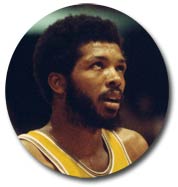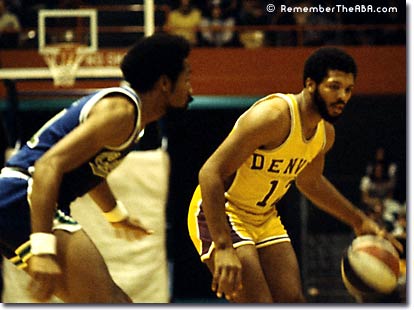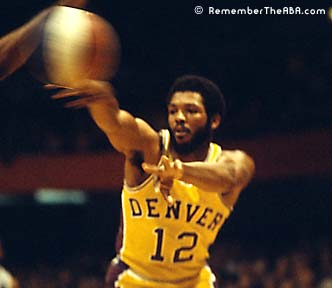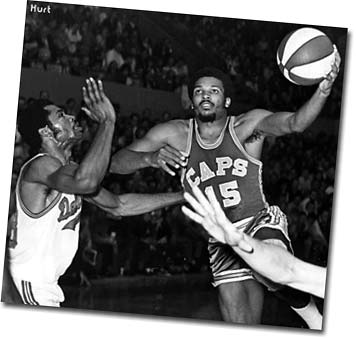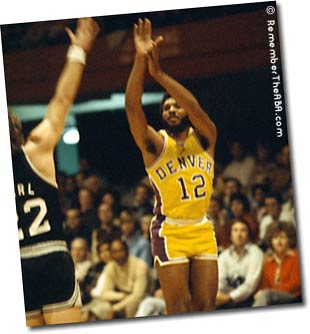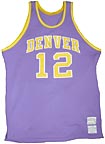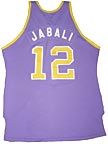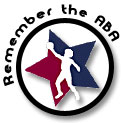
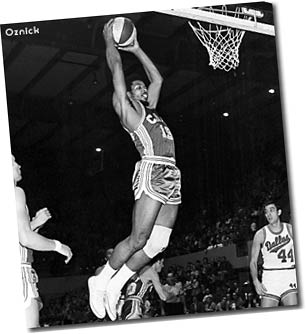 |
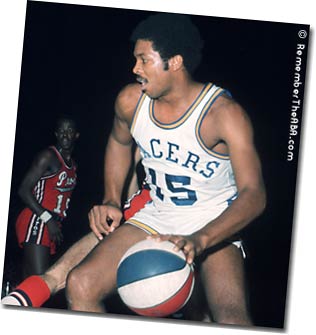 |
|
|||||||||||||||||||
|---|---|---|---|---|---|---|---|---|---|---|---|---|---|---|---|---|---|---|---|
| GP | Min | FGM | FGA | FG% | 3PM | 3PA | 3P% | FTM | FTA | FT% | TReb | AST | PF | Dq | Pnts | RPG | APG | PPG | |
| 447 | 15264 | 2663 | 6182 | .431 | 322 | 1011 | .318 | 2017 | 2669 | .756 | 2985 | 2389 | 1544 | 9 | 7665 | 6.7 | 5.3 | 17.1 | |
| 36 | 1209 | 221 | 532 | .415 | 11 | 66 | .167 | 198 | 282 | .702 | 306 | 115 | 111 | 1 | 651 | 8.5 | 3.2 | 18.1 | |
| 4 | 87 | 13 | 38 | .342 | 1 | 7 | .143 | 3 | 6 | .500 | 17 | 12 | 10 | - | 30 | 4.3 | 3.0 | 7.5 | |
|
On January 23, 2004, the Oakland Tribune newspaper published an article detailing the history of one of the ABA's most memorable teams, the 1968-69 Oakland Oaks. The Oaks were coached by Hall-of-Fame coach Alex Hannum, and boasted players like Jabali, Rick Barry, Doug Moe and Larry Brown. They won the ABA title after an incredible 60-18 season. In the article, former ABA and NBA superstar Barry is quoted as saying that: "I had [an Oaks] teammate who wouldn't pass me the ball because I was white." The article's author, Dave Newhouse, specifically notes this as a reference to Jabali. Upon reading the article and Barry's quote, Jabali was moved to explain his perception of race relations and issues in the late 1960's. Jabali penned this essay in March 2004. The piece addresses Barry's quote and Jabali's own attitude in the ABA. It also examines some larger issues of race in American society. |
|
Warren went on to have a great game and for the next couple of months every game I saw him play was more impressive than the previous one. When healthy he truly was one of the great all-around players of all time -- a great shooter, great passer, great rebounder (that year he was a unanimous selection to the all-star team as a 6'2" forward!), great defender -- with a style that was a perfect blend of grace and power. Alas, he hurt his knee and a week after he scored a career high 46 points he went under the knife and his season was over. Of course the Caps moved after their only season, and I moved to a non-ABA city. I thought I might never see him play again, although I followed his career closely in the newspapers, through several teams and a name change. In 1973 he was 1st-team all-ABA for the Denver Rockets, as well as MVP of the All-Star game. The next season he was also a Western Conference starter in the All-Star game, and then something happened which to my knowledge has never happened before or since in the history of professional sports: the day after the All-Star game Jabali was placed on waivers, and no team picked him up. I was aware of his reputation as a black militant and a troublemaker but this was incredible. I remember reading that he'd done something during All-Star weekend that embarrassed and enraged the (white) owners, and they'd obviously blacklisted him. Shortly after that I read that he'd moved to Africa, and it seemed his career was over. Then, in the fall of 1974 I moved to Los Angeles. Around that time, the San Diego Conquistadors were desperate for a point guard. They tracked Warren down in Tanzania and signed him. I drove down and saw him play several times that season. In the five years since I'd seen him in DC he'd put on weight, and knee and back problems had robbed him of his leaping ability, but he had his moments, and was still a great floor general. I went down for a Nets game in February, looking forward to seeing Dr.J for the first time since his rookie year with the Squires. Going in the "Q's" had a seven-game losing streak, and the Nets had an eight-game winning streak. The only memorable thing about this game's regulation play was that Dr. J scored 45 on a dazzling assortment of moves and shots. In spite of this about half the crowd filed out with several minutes to play and the Nets comfortably ahead. Then the Conquistadors came to life. Travis Grant and Dwight "Bo" Lamar started filling it up from outside, and Jabali started taking it to the hole. I'd long since resigned myself to never again seeing Warren dunk like he used to, but to my amazement, with about 30 seconds left and the Q's down five he drove the lane, took the ball in his left hand, lifted off like a great bird of prey, and threw down a thunderous dunk, getting fouled in the process. That cut the lead to two and a Grant jumper from the corner at the buzzer sent the game into OT. Dr. J scored 12 more in the 1st OT period, giving him 57, but the Q's hung in there and another buzzer-beater sent it into OT #2. With two minutes left in that period, Doc had 61 and climbing. At this point Warren was in the groove and they decided to switch him onto Erving. The 2nd overtime period ended with another last second shot to tie, as did the 3rd. In the 4th OT the Q's finally pulled away. The final score was 176-166, at that time the highest scoring game in the history of pro basketball. But Dr. J finished with "only" (a career high) 63. In the last 12 minutes of the game, with Jabali guarding him, he managed only a meaningless dunk shot in the final seconds with the game out of reach. Warren scored 19 of his 23 points at the end of regulation and in overtime. That was Warren's last season. My final memory of him, from the last game I saw him play, is him walking off the court, his tiny son next to him holding his hand. He didn't look like the angry young man anymore. He looked more mature, more at peace with himself and the world. After his career ended I had no idea what happened to him, and I was glad to see that he is alive and was able to come to the Reunion in Indianapolis. I wish I could have been there. Certainly he deserves the honor of being named one of the top 30 players in the league. I'm still an avid NBA fan, but I'm not as impressionable as I was when I was younger. Yeah, I know Michael is the greatest player who ever lived, but Hakeem is the only player to crack my all-time favorite five in the last quarter-century. The rest of the team consists of the idols of my youth -- Honeycomb, The Pearl, Doc, and The Rock -- Warren Jabali." |
